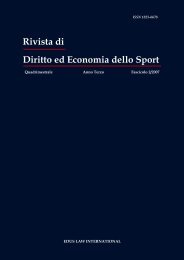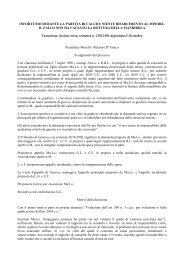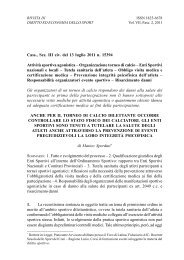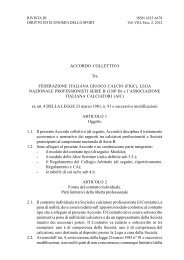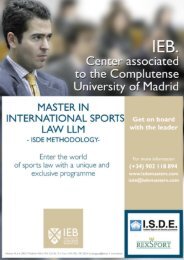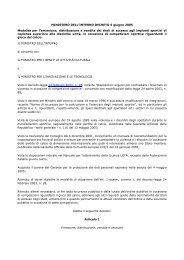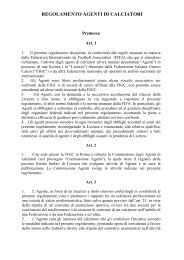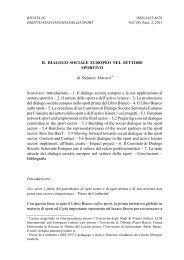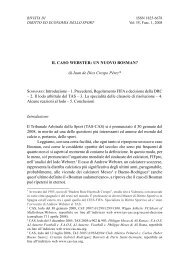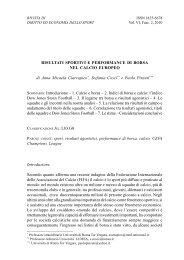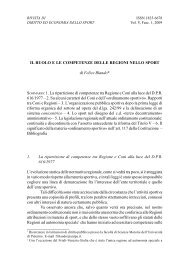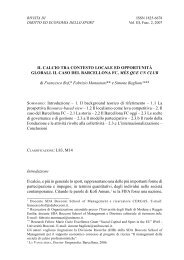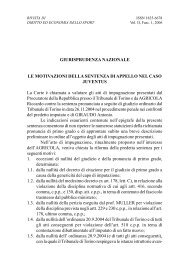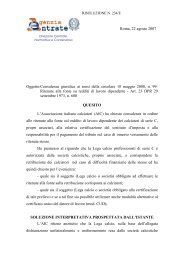European Sports Law and Policy Bulletin THE BERNARD ... - Slpc.eu
European Sports Law and Policy Bulletin THE BERNARD ... - Slpc.eu
European Sports Law and Policy Bulletin THE BERNARD ... - Slpc.eu
Create successful ePaper yourself
Turn your PDF publications into a flip-book with our unique Google optimized e-Paper software.
94 Wil Van Megenactivity is concerned. The Bernard case 4 relates to an aspect already addressedin the Bosman case, i.e. the situation with regard to the training of young footballplayers at their clubs. A sound training structure is essential to the supply ofsuccessful top sports men <strong>and</strong> women. In order to ensure a return on the investmentinvolved, a regulation existed in France that obliged young players to sign a contractwith the club that trained them, as soon as a contract of this kind was offered tothem. The regulation also contained a provision that applied in the case of theplayer refusing to sign the contract. This provision implied that the player couldnot play in France for a period of two years <strong>and</strong> compensation was payable in theevent of the player’s departure for a country other than France. In this case, theFrench club Olympique Lyonnais claimed compensation from the English clubNewcastle <strong>and</strong> the player Olivier Bernard.The most important question submitted to the ECJ was whether the Frenchregulation constituted a restriction on the freedom of movement of workers <strong>and</strong>, ifso, whether the importance of the regulation was capable of justifying this restriction.The Court found that the French regulation was incompatible with EU law. Inaddition, the Court stated that the training of young players is a legitimate objectivethat deserves to be protected. This should be done, however, within the frameworkof the general principles that apply in this respect.1. The general significance of the Bernard judgmentFirst of all, the judgment confirms that the provisions of <strong>European</strong> law can beapplied effectively to the pursuit of professional sport. Once again, the necessityof exempting sport from this framework has not been demonstrated.The dem<strong>and</strong>s of the major sports organizations, such as the IOC, FIFA<strong>and</strong> UEFA to grant more autonomy to sport, certainly have no legal basis. Article165 TFEU recognizes sport as an area of special attention within the <strong>European</strong>Union, but as no more than that. It certainly does not constitute <strong>European</strong>acknowledgment of the autonomy of sport. The FIFA has now halted attempts tohave the 6+5 rule 5 introduced, apparently because realization has dawned theretoo that this rule is incompatible with the right of freedom of movement of workersinside the EU.On the other h<strong>and</strong>, the Court states that it has taken the specificcharacteristics of sport into account. This is by no means exceptional, because theCourt has also taken account of the special aspects of business sectors other thansport in the judgments it has passed. There is no valid reason to assume that sportis so special that it should be exempted from Community law.____________________4Case C-325/08 Olympique Lyonnais SASP v. Olivier Bernard <strong>and</strong> Newcastle United, 16 March2010, not published yet in the ECR.5The 6+5 rule means that a football match should start with at least 6 players from the samenational background as the club for which they play.



